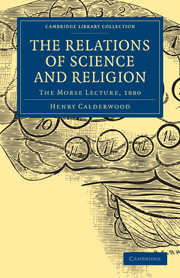Book contents
- Frontmatter
- EXTRACT FROM THE DEED OF TRUST, ESTABLISHING THE MORSE LECTURESHIP
- PREFACE
- Contents
- LECTURE I CONDITIONS OF THE INQUIRY
- LECTURE II EXPERIENCE GATHERED FROM PAST CONFLICTS
- LECTURE III INORGANIC ELEMENTS IN THE UNIVERSE
- LECTURE IV ORGANIZED EXISTENCE. LIFE AND ITS DEVELOPMENT
- LECTURE V RELATIONS OF LOWER AND HIGHER ORGANISMS
- LECTURE VI HIGHER ORGANISMS;—RESEMBLANCES AND CONTRASTS
- LECTURE VII MAN'S PLACE IN THE WORLD
- LECTURE VIII DIVINE INTERPOSITION FOR MORAL GOVERNMENT
- APPENDIX
LECTURE VIII - DIVINE INTERPOSITION FOR MORAL GOVERNMENT
Published online by Cambridge University Press: 05 October 2010
- Frontmatter
- EXTRACT FROM THE DEED OF TRUST, ESTABLISHING THE MORSE LECTURESHIP
- PREFACE
- Contents
- LECTURE I CONDITIONS OF THE INQUIRY
- LECTURE II EXPERIENCE GATHERED FROM PAST CONFLICTS
- LECTURE III INORGANIC ELEMENTS IN THE UNIVERSE
- LECTURE IV ORGANIZED EXISTENCE. LIFE AND ITS DEVELOPMENT
- LECTURE V RELATIONS OF LOWER AND HIGHER ORGANISMS
- LECTURE VI HIGHER ORGANISMS;—RESEMBLANCES AND CONTRASTS
- LECTURE VII MAN'S PLACE IN THE WORLD
- LECTURE VIII DIVINE INTERPOSITION FOR MORAL GOVERNMENT
- APPENDIX
Summary
THE view given in previous lectures of the most prominent features of the recent advances in scientific knowledge most intimately concerning our religious conceptions of the origin and government of the world, may afford some aid towards forming a judgment of the points of contact and apparent conflict. A brief summary will afford the best introduction to the lines of inquiry with which the present discussion may be brought to a close.
First, as to the inorganic in the universe, recent investigations favor the conclusion that neither the matter in the world, nor the energy, can be increased or diminished by operation of any laws known to apply to such existence. The laws under which these two forms of being hold their place in the world involve only change of distribution and relation. Both matter and energy are, however, perpetually undergoing change or transformation, and whether the change be for the better or for the worse in the history of the universe as a whole, the fact of unceasing change in subordination to fixed law, is clear evidence that matter and energy are not eternal or self-subsisting, but are dependent on some transcendent existence imposing the laws determining their relations.
Second, as to organized existence, recent researches go to prove that there is in all animals a measure of adaptability to surrounding conditions of life, providing for “adaptive changes” in the organism, which become fixed, and are transmitted to succeeding generations of the same order under the law of heredity.
- Type
- Chapter
- Information
- The Relations of Science and ReligionThe Morse Lecture, 1880, pp. 275 - 310Publisher: Cambridge University PressPrint publication year: 2009First published in: 1881



